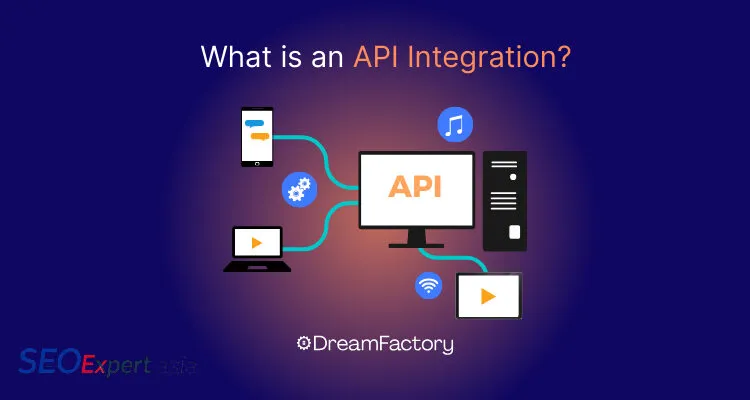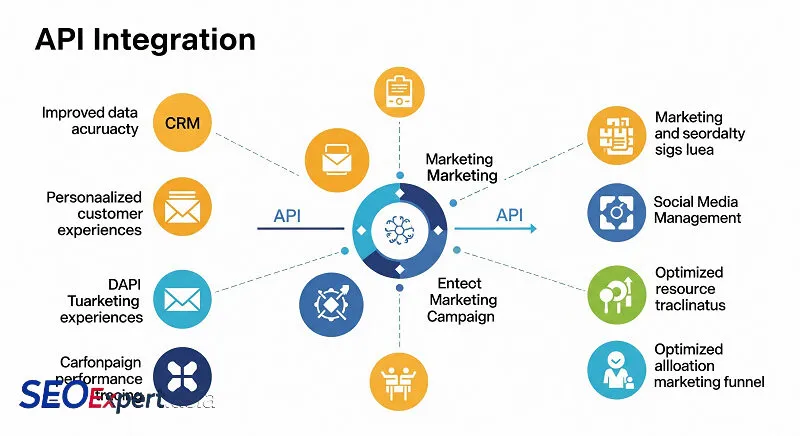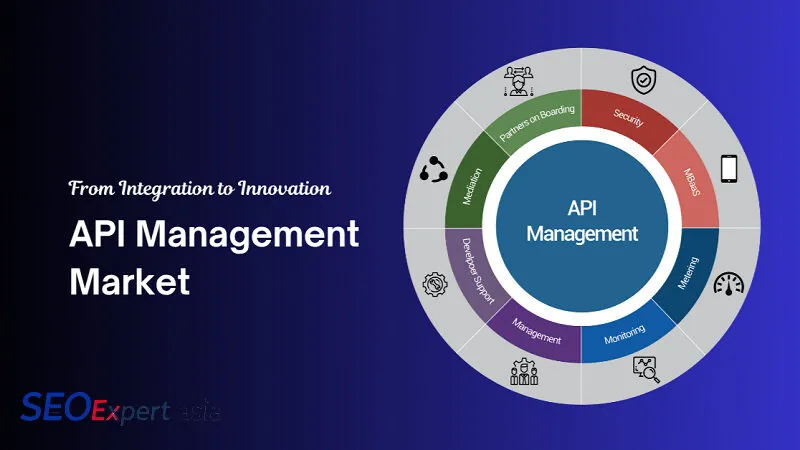In the digital-first business landscape, seamless connectivity between applications has become critical. At the heart of this connectivity lies the API Integration Developer Marketing role—a unique intersection between technical development and marketing strategy. These professionals bridge systems, automate workflows, and enable data-driven campaigns, empowering marketers to deliver real-time personalization, track ROI effectively, and optimize performance at scale.
In this guide, we will explore the crucial role of an API Integration Developer in marketing, the skills required, tools used, how they collaborate with marketing teams, and how their work intersects with the tasks of a Seoexpert.
What Does an API Integration Developer in Marketing Do?

An API Integration Developer Marketing specialist is responsible for connecting various marketing platforms, customer relationship management (CRM) systems, analytics tools, and content management systems (CMS) using APIs (Application Programming Interfaces). This integration ensures that data flows freely and accurately between systems—breaking down silos and making marketing automation and personalization possible.
Some common tasks of an API Integration Developer Marketing context include:
- Connecting a website’s contact form to a CRM like Salesforce or HubSpot.
- Integrating email platforms (e.g., Mailchimp or Klaviyo) with e-commerce stores.
- Syncing user behavior data from web analytics tools (like Google Analytics) with advertising platforms such as Facebook Ads or Google Ads.
- Automating data enrichment processes using third-party APIs like Clearbit or ZoomInfo.
- Creating custom APIs for proprietary data sources to interact with marketing dashboards.
In essence, this role enables marketers to move from static, campaign-based execution to agile, data-informed growth strategies. And for a Seoexpert, these integrations mean more reliable data insights and smarter SEO decisions.
Essential Skills and Tools for API Integration Developers in Marketing
To succeed as an API Integration Developer Marketing professional, one must blend software engineering skills with an understanding of marketing data needs. Here’s a breakdown of the core competencies:
1. Strong Programming Foundations
Most developers in this role use languages like:
- JavaScript (especially for frontend-to-backend integrations)
- Python (for scripting and API automation)
- PHP or Ruby (common in CMSs like WordPress and eCommerce platforms like Shopify)
A deep understanding of RESTful APIs, JSON, XML, and OAuth protocols is essential. SOAP APIs may still be encountered in legacy systems.
2. Familiarity with Marketing Tools and Platforms
A developer in this field must understand the marketing stack, including:
- CRMs (Salesforce, HubSpot, Zoho)
- Email platforms (Mailchimp, ActiveCampaign, Klaviyo)
- Web analytics tools (Google Analytics, Mixpanel, Segment)
- Advertising APIs (Facebook Marketing API, Google Ads API)
Understanding how these platforms use and structure data allows for faster integration and better results.
3. Workflow Automation and iPaaS Tools
API Integration Developer Marketing often work with platforms like:
- Zapier
- Integromat (Make)
- Tray.io
- Workato
These iPaaS (Integration Platform as a Service) tools help build integrations without full-stack coding, which accelerates marketing operations.
4. Security and Compliance Awareness
Handling user and customer data involves strict compliance with GDPR, CCPA, and other regulations. Developers must implement secure authentication, data encryption, and follow best practices in data governance.
These skills not only empower developers but also help Seoexpert professionals interpret marketing signals accurately from integrated data sources.
We are currently hiring a talented SEO Specialist with a strong understanding of the Vietnamese language to join our dynamic marketing team. The ideal candidate will have proven experience in search engine optimization, keyword strategy, data analysis, and improving website rankings—especially within the Vietnamese market. You will work closely with both the content and technical teams to ensure all on-site elements are search engine-friendly and culturally relevant to Vietnamese audiences. A deep knowledge of Vietnamese SEO trends, local search behaviors, and language-specific nuances is a must. If you are passionate about Digital Marketing, possess logical thinking, creativity, and stay updated with the latest SEO practices, apply now and help us grow our presence in Vietnam and beyond.
The Role of API Integration Marketing Campaigns
Marketing today is no longer a one-channel effort. Campaigns span multiple platforms—email, search, social, website, chat, and mobile apps. API Integration Developers make it possible to coordinate all these touchpoints in real time.
Personalization at Scale
Using APIs, developers can connect CRM data to email tools to dynamically personalize subject lines, content, and send times. For example, a returning customer visiting a product page can automatically receive a retargeting email based on browsing history—enabled entirely through backend API workflows.
Real-Time Campaign Optimization
Integrating Google Analytics or Facebook Ads data into a custom dashboard via API allows marketing teams to make decisions faster. This is especially useful during paid campaigns, product launches, or flash sales.
Lead Routing and Enrichment
Developers can build logic to automatically assign new leads to appropriate sales reps based on region, industry, or behavior, thanks to real-time CRM integrations. They can also use third-party APIs to enrich leads with company size, revenue, or tech stack—vital insights for both marketing and sales teams.
For a Seoexpert, these integrations mean better attribution modeling, deeper customer insights, and access to unified data—critical when optimizing for search engine visibility.

Collaboration Between API Developers and Marketing Teams
One of the unique aspects of the API Integration Developer Marketing role is the close collaboration with non-technical stakeholders. Developers must translate marketing goals into technical specifications.
Use Case: Integrating SEO Data
A Seoexpert working on a large eCommerce site might request real-time keyword ranking data, backlink data, or page performance metrics. The API Integration Developer Marketing can fetch this data using APIs from tools like:
- Ahrefs API
- SEMrush API
- Google Search Console API
This collaboration allows for creating dynamic SEO dashboards, automating weekly SEO performance reports, or even triggering alerts when a ranking drops significantly.
Use Case: Conversion Attribution
Marketers often struggle to attribute conversions across multiple channels. Developers can build a custom API solution that tags users across platforms and consolidates their journey—enabling advanced attribution modeling beyond what standard analytics tools provide.
Ultimately, a strong relationship between the developer and the marketing team—including the Seoexpert—results in better campaigns, faster insights, and higher ROI.
We are looking for an experienced SEO Specialist fluent in Vietnamese to work remotely with our creative and dynamic marketing team. The ideal candidate will have a solid background in search engine optimization, keyword research, data analysis, and improving website rankings on Google, especially for the Vietnamese market.
Future of API Integration Developer Marketing
The API landscape in marketing is rapidly evolving. Here are a few trends shaping the future:
1. AI and API Convergence
APIs are increasingly used to access AI models. Developers can integrate language models (like OpenAI’s GPT), image recognition APIs, or recommendation engines into marketing campaigns. This enables smarter personalization and automated content generation—tools that are just as valuable to a Seoexpert optimizing content for user intent.
2. Headless CMS and Microservices
Headless CMSs like Contentful or Strapi expose all their content via API. API Integration Developer Marketing ensure that content appears dynamically across web, mobile, and IoT platforms—vital for omnichannel marketing strategies.
3. Serverless Functions and Event-Driven Architecture
Modern developers leverage AWS Lambda, Google Cloud Functions, or Azure Functions to trigger API-based workflows in real-time without maintaining traditional servers. These technologies enable more efficient and responsive marketing systems.
4. Privacy-First Marketing
As cookies are phased out, API-based server-side tracking is becoming critical. Developers are tasked with building cookieless tracking solutions that still deliver accurate attribution while complying with privacy laws.
These trends make it clear: the API Integration Developer Marketing role will only grow in importance—and smart Seoexpert professionals would benefit from understanding these backend capabilities.

Conclusion
The rise of connected digital ecosystems has transformed the way marketers operate—and API Integration Developer Marketing specialists are the architects behind this evolution. With the ability to link platforms, automate processes, and unlock real-time insights, these developers enable high-performance, data-driven marketing strategies.
For professionals in marketing, including the modern Seoexpert, collaborating with API integration developers opens doors to richer data, faster decisions, and more scalable results. As the digital world continues to evolve, those who master the synergy between code and campaigns will shape the future of marketing.
